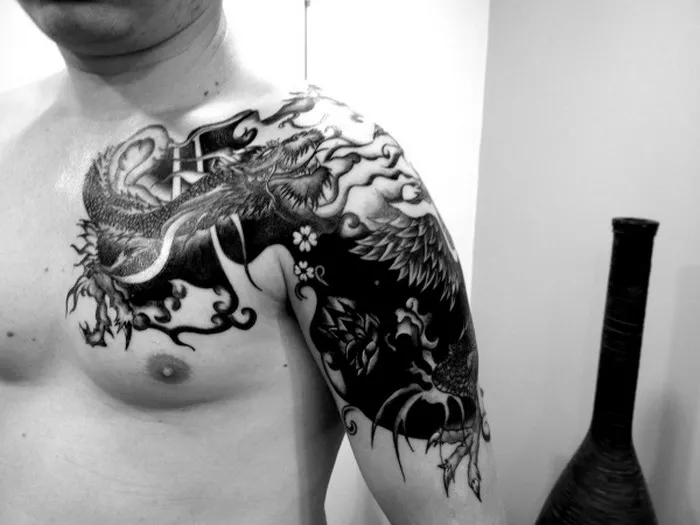Traveling to Japan is a dream for many, with its rich history, stunning landscapes, and vibrant culture. However, for those with tattoos, particularly conspicuous ones like a dragon tattoo, there may be concerns about how they will be perceived and whether they will face any restrictions during their visit. In this article, we delve into the nuances of traveling to Japan with a tattoo, exploring both the cultural context and the practical considerations for tattooed visitors.
Legal Status of Tattoos in Japan
Contrary to popular belief, having a tattoo is not illegal in Japan. However, there are social stigmas associated with tattoos, deeply rooted in the country’s history. Historically, tattoos have been linked to criminal activity, particularly with the yakuza, Japan’s organized crime syndicates. As a result, tattoos have long been associated with delinquency and societal rebellion.
In recent years, attitudes towards tattoos have begun to shift, especially among younger generations. With increased exposure to Western culture and a growing acceptance of individual expression, tattoos are becoming more commonplace, particularly in urban areas like Tokyo. However, despite this gradual change, the negative stigma surrounding tattoos persists in many traditional and conservative circles.
Perception of Tattoos
The perception of tattoos in Japan, including dragon tattoos, is deeply influenced by their association with the yakuza. The image of a dragon winding its way across someone’s skin can evoke fear and intimidation, echoing the tattoos often adorned by members of organized crime groups. As such, individuals with visible tattoos, especially large and elaborate ones like a dragon, may encounter prejudice or suspicion in certain social settings.
It’s important to recognize, however, that perceptions vary widely among different segments of Japanese society. While some may still hold negative views towards tattoos, others are more open-minded and accepting. Additionally, attitudes tend to be more relaxed in cosmopolitan areas, where diversity and individuality are celebrated.
Tattoo Restrictions in Public Places
One of the most practical concerns for travelers with tattoos is the issue of access to public facilities. Many traditional establishments in Japan, such as onsens (hot springs), pools, gyms, and ryokans (traditional inns), have policies against tattoos. This stems from a desire to maintain a certain image of purity and cleanliness, as tattoos are often associated with impurity and taboo.
These restrictions can pose challenges for tattooed visitors, as they may find themselves excluded from certain cultural experiences. However, it’s essential to understand that these policies are not necessarily discriminatory but rather reflect deeply ingrained cultural norms. In many cases, establishments impose tattoo bans to respect the preferences of their other guests and to uphold traditional customs.
Tattoo-Friendly Locations
Despite the prevalence of tattoo restrictions, there are still plenty of tattoo-friendly options available to visitors in Japan. In recent years, a growing number of onsens, hotels, and other businesses have relaxed their policies towards tattoos to accommodate the increasing number of tattooed tourists.
One way to identify tattoo-friendly establishments is to research in advance or seek recommendations from other travelers with tattoos. Several online resources and forums provide information on places that welcome guests with tattoos, helping travelers plan their itineraries accordingly. Additionally, some establishments offer discreet solutions for covering tattoos, allowing visitors to enjoy their facilities without fear of discrimination.
Etiquette and Manners
When traveling in Japan with a tattoo, it’s essential to be mindful of local customs and etiquette. While attitudes towards tattoos are evolving, they may still be perceived as offensive or disrespectful in certain contexts. As a sign of respect, visitors with tattoos should be prepared to cover them when entering traditional establishments or interacting with more conservative members of society.
Additionally, it’s crucial to approach discussions about tattoos with sensitivity and tact. Rather than flaunting their tattoos or challenging cultural norms, travelers should strive to integrate seamlessly into their surroundings. By demonstrating an understanding of and respect for Japanese customs, visitors can foster positive interactions and bridge cultural divides.
Travel Tips for Tattooed Visitors
For travelers with tattoos, navigating Japan requires a combination of preparation and flexibility. Here are some practical tips to enhance the experience:
1. Research tattoo-friendly establishments in advance and make reservations when possible.
2. Carry a cover-up garment, such as a long-sleeved shirt or scarf, to conceal tattoos when necessary.
3. Be prepared to politely comply with requests to cover tattoos in certain situations, even if they seem arbitrary or unfair.
4. If confronted about a tattoo, remain calm and respectful, and try to explain its significance without causing offense.
5. Consider exploring alternative cultural experiences, such as modern art galleries or contemporary performance venues, where tattoos are more widely accepted.
By approaching their travels with awareness and sensitivity, tattooed visitors can enjoy everything that Japan has to offer while respecting its cultural traditions.
Cultural Context of Dragon Tattoos
In Japanese culture, the dragon holds significant symbolic meaning, representing strength, wisdom, and good fortune. Unlike in Western mythology, where dragons are often depicted as fearsome creatures, the Japanese dragon is viewed more positively, associated with protection and auspiciousness.
Dragon tattoos, therefore, carry a special significance in Japan, symbolizing power, resilience, and spiritual enlightenment. Traditionally, these tattoos were worn by warriors and samurai as a mark of their bravery and loyalty. Today, dragon tattoos remain popular among individuals seeking to embody these qualities and connect with Japan’s rich cultural heritage.
However, despite their cultural significance, dragon tattoos may still be subject to the same social stigmas as other types of tattoos in Japan. While attitudes are gradually changing, particularly among younger generations, it’s essential for travelers to approach their tattoos with respect and sensitivity, mindful of the cultural context in which they are situated.
In conclusion, traveling to Japan with a dragon tattoo requires an understanding of both the cultural sensitivities surrounding tattoos and the practical considerations of navigating a society where tattoos are still somewhat taboo. By respecting local customs, seeking out tattoo-friendly establishments, and approaching interactions with sensitivity, tattooed visitors can enjoy a fulfilling and enriching experience in Japan, dragon tattoo and all.

